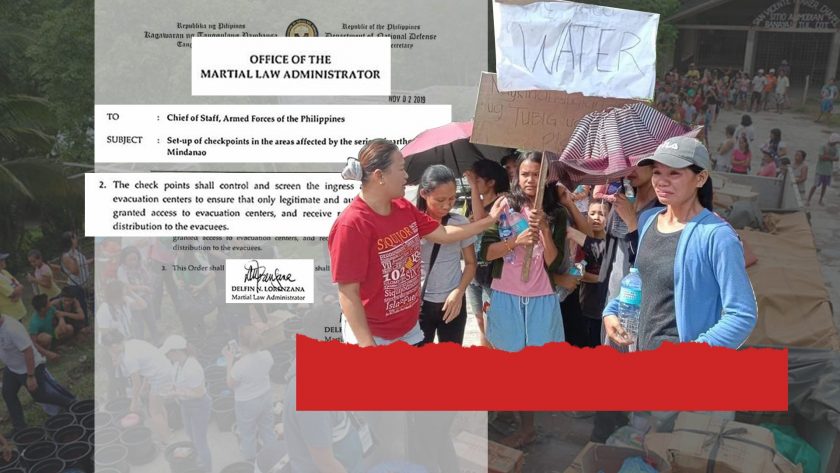“Red-tagging puts humanitarian and development workers in grave danger of being harassed by state forces while delivering aid to disaster-stricken communities.”
By JANESS ANN J. ELLAO
Bulatlat.com
MANILA – The Citizen’s Disaster Response Center has been busy the past weeks providing relief operations in many quake-affected areas in Mindanao. This amid the military’s brazen red-tagging of CDRC and several other non-government and faith-based humanitarian agencies and the continuing militarization of humanitarian response.
The 35-year-old CDRC was among the humanitarian agencies named as front organizations of the Communist Party of the Philippines (CPP) during a recent congressional hearing. The red-tagging came shortly after Martial Law Administrator and Defense Secretary Delfin Lorenzana ordered the Armed Forces of the Philippines to set up checkpoints in areas affected by earthquakes in Mindanao.
The checkpoints, Lorenzena said, will “control and screen the ingress and egress of people” and ensure that “only legitimate and authorized relief workers are granted access tThe checkpoints, Lorenzena said, will “control and screen the ingress and egress of people” and ensure that “only legitimate and authorized relief workers are granted access to evacuation areas.”
Dubbed as the “Martial Law Instructions No. 02,” the order remains in effect to this day, much to the dismay of humanitarian workers as this endangers their safety and could hamper their work.
CDRC Executive Director Kim Leduna said that delivering humanitarian aid and development programs in communities deprived of social services “are not acts of terror.”
Understanding ‘Core Humanitarian Standards’
The apparent militarization of earthquake-affected communities in Mindanao is an affront to the principles of humanitarian work, according to National Council of Churches in the Philippines (NCCP) Acting Secretary General Minnie Anne Calub.
In an internview with Bulatlat, Calub cited the Core Humanitarian Standard on Quality and Accountability, or simply CHS, a result of a global consultation to provide quality and effective humanitarian response, of which the NCCP and many local and international humanitarian agencies adhere to.
Humanitarian action, the CHS states, is guided by four widely accepted principles such as humanity, impartiality, independence, and neutrality. All these four principles – most especially impartiality – pertains to humanitarian action as to having “no adverse distinction on the basis of nationality, race, gender, religious belief, class, or political opinion.”
The militarization of earthquake-affected communities will result to the hampering of what should be a free flow of humanitarian aid, said Calub.
“Humanitarian work centers on our belief in human dignity that is translated to human rights,” said Calub, who has been involved in NCCP’s humanitarian work since 1996 until she started serving as its acting secretary general last year.
In Mindanao, where a martial law rule is currently in place, grassroots humanitarian agencies get their respective clearances to ensure that they are not held in checkpoints.
“We received a report of a member of a people’s organization who was held. They planned to deliver relief goods of about a truckload of rice to their relatives affected by the earthquake. The military, however, did not allow them to enter,” Elviza Avila-Amante of Disaster and Response Center (DIRECT) told Bulatlat in a text message.
Militarizing humanitarian response?
Instead of monitoring the ingress and egress of humanitarian workers, Calub said the Philippine military should instead revisit its primary tasks as provided in the Republic Act No. 10121 or the Philippine Disaster Risk Reduction and Management Act of 2010.
Under the law, the Department of National Defense will head the National Disaster Coordinating Council. The Armed Forces of the Philippines’ chief, on the other hand, is among the listed members of the national council.
The CDRC called out the AFP for its “gross negligence for legal repercussions” that the red-tagging may bring to non-government institutions, especially as it is being carried out without evidence and due process.
This, the CDRC said, “puts humanitarian and development workers in grave danger of being harassed by state forces while delivering aid to disaster-stricken communities.”
Such militaristic response is not surprising. In recent history, the same response was accorded to communities heavily damaged by Typhoon Haiyan six years ago.
Just a month after the typhoon struck Central Philippines, the military proudly claimed that it “disrupted” the affairs of the CPP and the New People’s Army in the area, adding that the armed clashes have been brought to zero since then.
Even international humanitarian group Oxfam found itself in the military’s list of “communist-terrorist groups.” in a statement, Oxfam has denied being part of the CPP, adding that the group has been legally registered and working in the country for more than 30 years.
“If our vision and mission in the Philippines have led to Oxfam being labelled a ‘local communist terrorist group’ or a funder of ‘communist terrorist groups’ then we find this a most troubling situation. These allegations affect not only us, but also put the communities and partners we work with at risk,” Oxfam said.
Work continues
Despite the continuing red-tagging, these humanitarian agencies have continued on their work of reaching out to the earthquake-affected communities.
Oxfam said that their forms of assistance are “extended to the most vulnerable in an impartial and non-partisan manner.”
The group added that instead of hindering them, organizations that work with poor communities that are continually struck by disasters should instead be encouraged.
Mindanao Interfaith Services Foundation Inc. (Misfi) also appealed for the red-tagging to stop, adding that for the past 35 years, it has been working with communities in Mindanao that are vulnerable to disasters. Among their advocacies include providing sustainable agriculture training to farmers and agro-ecology.
In a statement, the Citizen’s Disaster Response Network, an umbrella group of 17 grassroots humanitarian agencies in the Philippines, said they will “hold our ground and stand by the poor sectors we serve. No amount of harassment and threat can make us cower in fear.”
The post Militarizing humanitarian response appeared first on Bulatlat.


